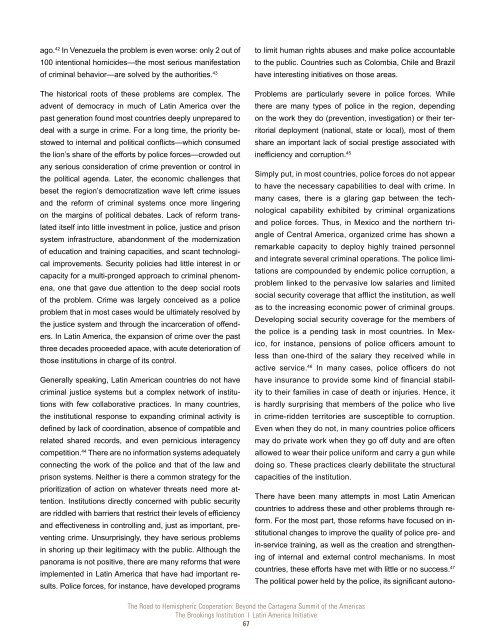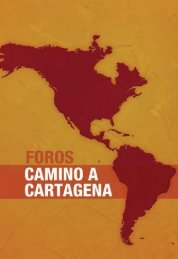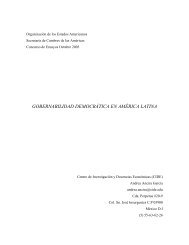The Road to Hemispheric Cooperation: Beyond the Cartagena
The Road to Hemispheric Cooperation: Beyond the Cartagena
The Road to Hemispheric Cooperation: Beyond the Cartagena
You also want an ePaper? Increase the reach of your titles
YUMPU automatically turns print PDFs into web optimized ePapers that Google loves.
ago. 42 In Venezuela <strong>the</strong> problem is even worse: only 2 out of<br />
100 intentional homicides—<strong>the</strong> most serious manifestation<br />
of criminal behavior—are solved by <strong>the</strong> authorities. 43<br />
<strong>The</strong> his<strong>to</strong>rical roots of <strong>the</strong>se problems are complex. <strong>The</strong><br />
advent of democracy in much of Latin America over <strong>the</strong><br />
past generation found most countries deeply unprepared <strong>to</strong><br />
deal with a surge in crime. For a long time, <strong>the</strong> priority bes<strong>to</strong>wed<br />
<strong>to</strong> internal and political conflicts—which consumed<br />
<strong>the</strong> lion’s share of <strong>the</strong> efforts by police forces—crowded out<br />
any serious consideration of crime prevention or control in<br />
<strong>the</strong> political agenda. Later, <strong>the</strong> economic challenges that<br />
beset <strong>the</strong> region’s democratization wave left crime issues<br />
and <strong>the</strong> reform of criminal systems once more lingering<br />
on <strong>the</strong> margins of political debates. Lack of reform translated<br />
itself in<strong>to</strong> little investment in police, justice and prison<br />
system infrastructure, abandonment of <strong>the</strong> modernization<br />
of education and training capacities, and scant technological<br />
improvements. Security policies had little interest in or<br />
capacity for a multi-pronged approach <strong>to</strong> criminal phenomena,<br />
one that gave due attention <strong>to</strong> <strong>the</strong> deep social roots<br />
of <strong>the</strong> problem. Crime was largely conceived as a police<br />
problem that in most cases would be ultimately resolved by<br />
<strong>the</strong> justice system and through <strong>the</strong> incarceration of offenders.<br />
In Latin America, <strong>the</strong> expansion of crime over <strong>the</strong> past<br />
three decades proceeded apace, with acute deterioration of<br />
those institutions in charge of its control.<br />
Generally speaking, Latin American countries do not have<br />
criminal justice systems but a complex network of institutions<br />
with few collaborative practices. In many countries,<br />
<strong>the</strong> institutional response <strong>to</strong> expanding criminal activity is<br />
defined by lack of coordination, absence of compatible and<br />
related shared records, and even pernicious interagency<br />
competition. 44 <strong>The</strong>re are no information systems adequately<br />
connecting <strong>the</strong> work of <strong>the</strong> police and that of <strong>the</strong> law and<br />
prison systems. Nei<strong>the</strong>r is <strong>the</strong>re a common strategy for <strong>the</strong><br />
prioritization of action on whatever threats need more attention.<br />
Institutions directly concerned with public security<br />
are riddled with barriers that restrict <strong>the</strong>ir levels of efficiency<br />
and effectiveness in controlling and, just as important, preventing<br />
crime. Unsurprisingly, <strong>the</strong>y have serious problems<br />
in shoring up <strong>the</strong>ir legitimacy with <strong>the</strong> public. Although <strong>the</strong><br />
panorama is not positive, <strong>the</strong>re are many reforms that were<br />
implemented in Latin America that have had important results.<br />
Police forces, for instance, have developed programs<br />
<strong>to</strong> limit human rights abuses and make police accountable<br />
<strong>to</strong> <strong>the</strong> public. Countries such as Colombia, Chile and Brazil<br />
have interesting initiatives on those areas.<br />
Problems are particularly severe in police forces. While<br />
<strong>the</strong>re are many types of police in <strong>the</strong> region, depending<br />
on <strong>the</strong> work <strong>the</strong>y do (prevention, investigation) or <strong>the</strong>ir terri<strong>to</strong>rial<br />
deployment (national, state or local), most of <strong>the</strong>m<br />
share an important lack of social prestige associated with<br />
inefficiency and corruption. 45<br />
Simply put, in most countries, police forces do not appear<br />
<strong>to</strong> have <strong>the</strong> necessary capabilities <strong>to</strong> deal with crime. In<br />
many cases, <strong>the</strong>re is a glaring gap between <strong>the</strong> technological<br />
capability exhibited by criminal organizations<br />
and police forces. Thus, in Mexico and <strong>the</strong> nor<strong>the</strong>rn triangle<br />
of Central America, organized crime has shown a<br />
remarkable capacity <strong>to</strong> deploy highly trained personnel<br />
and integrate several criminal operations. <strong>The</strong> police limitations<br />
are compounded by endemic police corruption, a<br />
problem linked <strong>to</strong> <strong>the</strong> pervasive low salaries and limited<br />
social security coverage that afflict <strong>the</strong> institution, as well<br />
as <strong>to</strong> <strong>the</strong> increasing economic power of criminal groups.<br />
Developing social security coverage for <strong>the</strong> members of<br />
<strong>the</strong> police is a pending task in most countries. In Mexico,<br />
for instance, pensions of police officers amount <strong>to</strong><br />
less than one-third of <strong>the</strong> salary <strong>the</strong>y received while in<br />
active service. 46 In many cases, police officers do not<br />
have insurance <strong>to</strong> provide some kind of financial stability<br />
<strong>to</strong> <strong>the</strong>ir families in case of death or injuries. Hence, it<br />
is hardly surprising that members of <strong>the</strong> police who live<br />
in crime-ridden terri<strong>to</strong>ries are susceptible <strong>to</strong> corruption.<br />
Even when <strong>the</strong>y do not, in many countries police officers<br />
may do private work when <strong>the</strong>y go off duty and are often<br />
allowed <strong>to</strong> wear <strong>the</strong>ir police uniform and carry a gun while<br />
doing so. <strong>The</strong>se practices clearly debilitate <strong>the</strong> structural<br />
capacities of <strong>the</strong> institution.<br />
<strong>The</strong>re have been many attempts in most Latin American<br />
countries <strong>to</strong> address <strong>the</strong>se and o<strong>the</strong>r problems through reform.<br />
For <strong>the</strong> most part, those reforms have focused on institutional<br />
changes <strong>to</strong> improve <strong>the</strong> quality of police pre- and<br />
in-service training, as well as <strong>the</strong> creation and streng<strong>the</strong>ning<br />
of internal and external control mechanisms. In most<br />
countries, <strong>the</strong>se efforts have met with little or no success. 47<br />
<strong>The</strong> political power held by <strong>the</strong> police, its significant au<strong>to</strong>no-<br />
<strong>The</strong> <strong>Road</strong> <strong>to</strong> <strong>Hemispheric</strong> <strong>Cooperation</strong>: <strong>Beyond</strong> <strong>the</strong> <strong>Cartagena</strong> Summit of <strong>the</strong> Americas<br />
<strong>The</strong> Brookings Institution ❘ Latin America Initiative<br />
67








